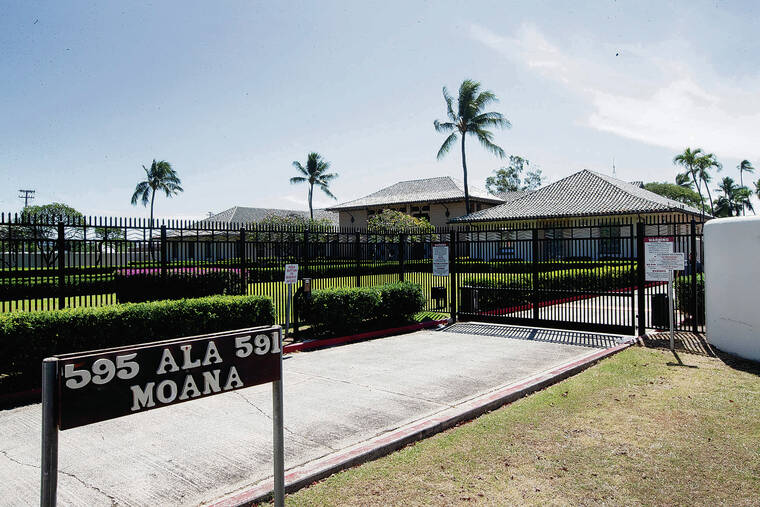HILO, Hawai‘i — A bill that would legalize the recreational use of cannabis by adults 21 and over cleared its first legislative hurdle on Tuesday.
A joint session of the Health and Human Services and Judiciary committees passed Senate Bill 3335, with amendments.
Those voting in favor were Sens. Joy San Buenaventura, a Puna Democrat and HHS chairwoman; Karl Rhoads, a Honolulu Democrat and the Judiciary chairman; and Brenton Awa, a Windward Oahu Republican.
The only no vote came from Sen. Brandon Elefante, a Leeward O‘ahu Democrat, who cited concerns raised by law enforcement officials and Department of Education Superintendent Keith Hayashi. Sen. Mike Gabbard, a Leeward O‘ahu Democrat, was excused.
There were 550 pages of written testimony, mostly in favor, submitted for the bill, which was crafted mostly by deputies to Attorney General Anne Lopez. Among the groups in opposition included law enforcement and hemp farmers — the latter citing concerns about its industry being regulated by the same officials that would control marijuana production, sale and enforcement.
In live testimony, Hayashi cautioned lawmakers about what he called “unintended costs associated with this action as a result of increased accessibility and acceptance of adult cannabis use” affecting schoolchildren.
Dave Day, a special assistant to Lopez, said she “made clear that issues of federal illegality, the growth of the illicit market, driving while high and problems protecting children, among others, are serious concerns that the Legislature must consider.”
“It’s true that something like 24 states already have legalized recreational pakalolo for adults,” Rhoads noted. “They’ve managed to cope, somehow. Won’t we manage to cope somehow, too?”
Day replied that the “national trend is toward legalization.”
“Recent polling in Hawai‘i has suggested that there’s broad support across the islands in respect to legalization,” he said. “And that very fact is one of the reasons why the attorney general chose … to take on this bill, and to … take the best parts from the other states in terms of the law, and present that to you as one possible option for you to consider.”
Deputy Attorney General Andrew Goff said it’s important that hemp and marijuana, as cannabinoids, be regulated by the same agency.
“They’re all the same product,” he said. “And currently, hemp is regulated by multiple agencies, which creates gaps in regulations and makes enforcement difficult. And I think it’s important to mention that this bill would fully fund hemp enforcement — which is currently not funded. “
Testifying in support, state Public Defender Jon Ikenaga said the cannabis market “already exists, and is underground and unaccountable.”
“Unregulated sellers do not pay taxes. They do not check identification to make sure buyers are 21 years or older. They do not test the purity of their products. Moreover, any disputes that arise in the illicit marketplace are not adjudicated in courts of law.”
Jordan Lowe, director of the state’s newly created Department of Law Enforcement, expressed concern that users of legalized marijuana would have firearms.
“It’s unlawful for a user of controlled substance to possess firearms and ammunition. And right now, under federal law, cannabis is still illegal,” he said.
Honolulu Prosecutor Steve Alm said he was told by visitor industry honchos that “Japanese tourists will stop coming” if Hawai‘i legalizes pot.
“If we legalize marijuana — like the folks in Colorado tell us, there are more marijuana stores than Starbucks and McDonald’s combined — you will change the character of your state forever. So, let’s not do that. Let’s keep Hawai‘i, Hawai‘i,” he said.
Todd Raybuck, Kaua‘i County police chief, echoed concerns about increased traffic fatalities that Hawai‘i Police Department Chief Ben Moszkowicz cited in written testimony.
“A recent study found marijuana-related traffic deaths increased in at least seven states that created a commercialized marijuana market by 10 percent and in some states up to 22 percent,” he said.
Big Island Grown Dispensaries co-founder and CEO Jaclyn Moore suggested amendments by the Hawai‘i Cannabis Industry Association “relating to reduction of up front costs, also relating to eliminating unnecessary spending.”
“These make it light enough that we can actually elevate this,” she said. “I also want to say the responsible thing to do from the legislative standpoint to protect the community, protect the kids, knowing what is going on, is to double down on the illegal infrastructure.”
Carrie Ann Shirota, policy director of the American Civil Liberties Union of Hawai‘i, said the ACLU “strongly supports legalization” but added “the proposed measure alarmingly ramps up law enforcement and creates a strict liability standard that will further criminalize and incarcerate people, including our youth.”
Amendments would make the governor the tie-breaking vote on selecting a chair and vice chair of a new Cannabis Control Board and remove individuals convicted of distribution of marijuana from criminal record expungement.
San Buenaventura changed the Jan. 1, 2026, effective date to a defective date of Dec. 31, 2050, to promote discussion. The bill would have to pass a thus far unscheduled joint session of the Commerce and Consumer Protection and Ways and Means committees to advance to a second Senate floor vote.
A companion measure, House Bill 2600, hasn’t been scheduled for a committee hearing.
•••
Reporter John Burnett can be reached at jburnett@hawaiitribune-herald.com.





Don’t legalize it, nobody want to be smelling that crap everywhere you go in public..plus what ever money the state makes from taxes would now have to be spent on more cops and legal cost of prosecuting and jailing new low level crime…plus the fact now you gonna lose out on good tourism…. just leave it the way it is now